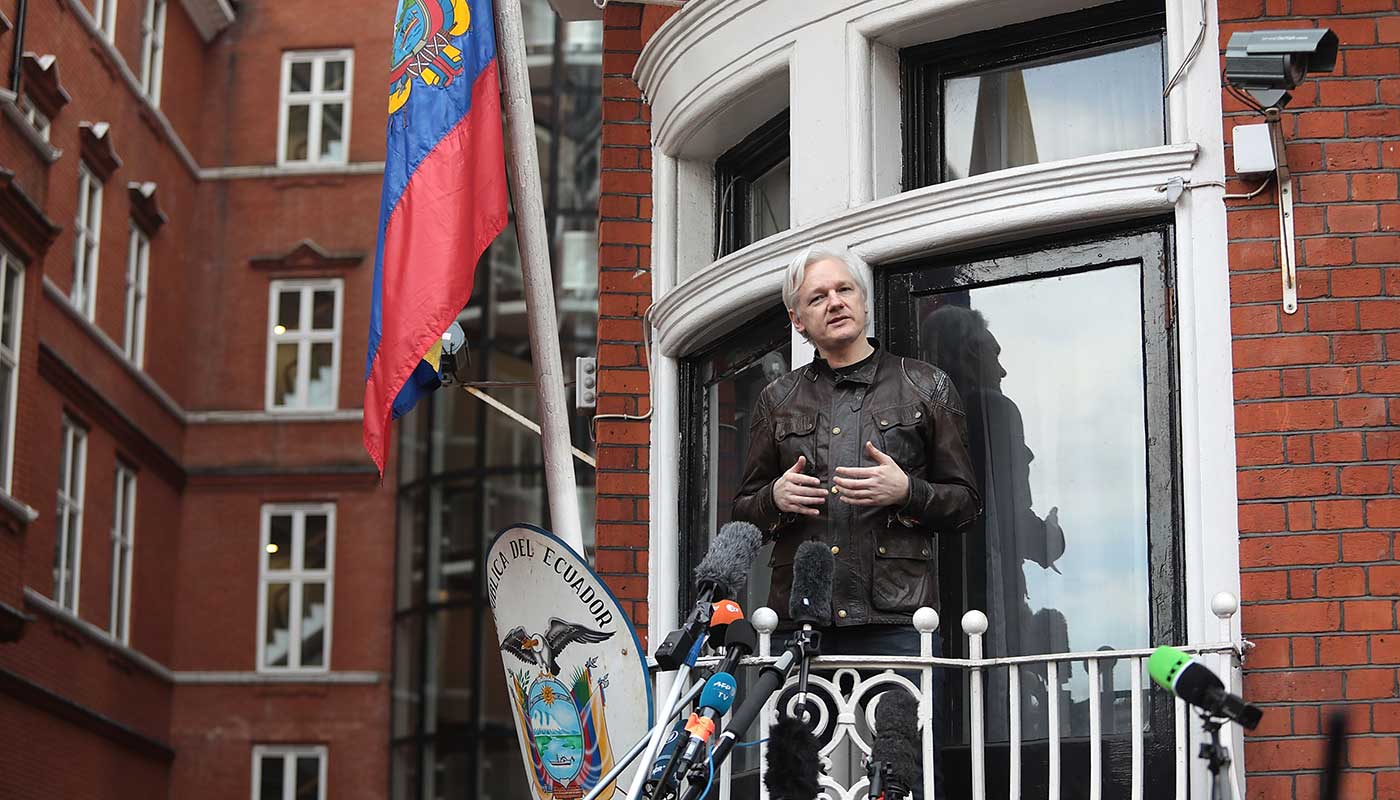Ecuador cuts Julian Assange’s internet access after ‘interference’
Wikileaks founder breached 2017 agreement not to meddle in other countries’s affairs, says embassy

A free daily email with the biggest news stories of the day – and the best features from TheWeek.com
You are now subscribed
Your newsletter sign-up was successful
Ecuador has announced that it has cut off Wikileaks founder Julian Assange’s internet access, claiming he had breached a 2017 agreement not to interfere with the matters of other nations.
“The government of Ecuador has suspended all systems that allow Julian Assange to communicate outside the Ecuadorian Embassy in London,” it said in a statement.
Ecuador did not reveal which of Assange’s recent communications was the reason for cutting off his access to the internet and social media.
The Week
Escape your echo chamber. Get the facts behind the news, plus analysis from multiple perspectives.

Sign up for The Week's Free Newsletters
From our morning news briefing to a weekly Good News Newsletter, get the best of The Week delivered directly to your inbox.
From our morning news briefing to a weekly Good News Newsletter, get the best of The Week delivered directly to your inbox.
However, the BBC says the move came after Assange “questioned accusations that Moscow was responsible for the poisoning of a Russian ex-spy and his daughter”.
It is not the first time the Ecuadorian government has cut Assange’s internet access. It was briefly suspended in October 2016, shortly after Wikileaks published speeches made by Hillary Clinton to Goldman Sachs, CNN says.
Assange moved into the embassy in June 2012 in a bid to avoid extradition to Sweden over allegations of sex crimes, which he denies.
Despite Sweden dropping the case, Assange remains in the embassy due to fears he would be extradited to the US if UK authorities arrested him for jumping bail.
A free daily email with the biggest news stories of the day – and the best features from TheWeek.com
-
 Antonia Romeo and Whitehall’s women problem
Antonia Romeo and Whitehall’s women problemThe Explainer Before her appointment as cabinet secretary, commentators said hostile briefings and vetting concerns were evidence of ‘sexist, misogynistic culture’ in No. 10
-
 Local elections 2026: where are they and who is expected to win?
Local elections 2026: where are they and who is expected to win?The Explainer Labour is braced for heavy losses and U-turn on postponing some council elections hasn’t helped the party’s prospects
-
 6 of the world’s most accessible destinations
6 of the world’s most accessible destinationsThe Week Recommends Experience all of Berlin, Singapore and Sydney
-
 Epstein files topple law CEO, roil UK government
Epstein files topple law CEO, roil UK governmentSpeed Read Peter Mandelson, Britain’s former ambassador to the US, is caught up in the scandal
-
 Iran and US prepare to meet after skirmishes
Iran and US prepare to meet after skirmishesSpeed Read The incident comes amid heightened tensions in the Middle East
-
 Israel retrieves final hostage’s body from Gaza
Israel retrieves final hostage’s body from GazaSpeed Read The 24-year-old police officer was killed during the initial Hamas attack
-
 China’s Xi targets top general in growing purge
China’s Xi targets top general in growing purgeSpeed Read Zhang Youxia is being investigated over ‘grave violations’ of the law
-
 Panama and Canada are negotiating over a crucial copper mine
Panama and Canada are negotiating over a crucial copper mineIn the Spotlight Panama is set to make a final decision on the mine this summer
-
 Why Greenland’s natural resources are nearly impossible to mine
Why Greenland’s natural resources are nearly impossible to mineThe Explainer The country’s natural landscape makes the task extremely difficult
-
 Iran cuts internet as protests escalate
Iran cuts internet as protests escalateSpeed Reada Government buildings across the country have been set on fire
-
 US nabs ‘shadow’ tanker claimed by Russia
US nabs ‘shadow’ tanker claimed by RussiaSpeed Read The ship was one of two vessels seized by the US military